- Home
- Jojo Moyes
The Girl You Left Behind Page 9
The Girl You Left Behind Read online
Page 9
'I thought you were a Russian bear,' I told him.
He had raised an eyebrow. We were in a packed brasserie off rue de Turbigo. 'GRRRRRRRR,' he growled, until I was helpless with laughter. He had crushed me to him, right there, in the middle of the banquette, covering my neck with kisses, oblivious to the people eating around us. 'GRRRRR.'
They had stopped singing in the other room. I felt suddenly self-conscious and stood, as if to clear the table.
'Please,' said the Kommandant, motioning me to sit down. 'Just sit a while longer. It's Christmas Eve, after all.'
'Your men will be expecting you to join them.'
'On the contrary, they enjoy themselves far more if their Kommandant is absent. It is not fair to impose myself on them all evening.'
But quite fair to impose yourself on me, I thought. It was then that he asked, 'Where is your sister?'
'I told her to go to bed,' I said. 'She is a little under the weather, and she was very tired after cooking tonight. I wanted her to be quite well for tomorrow.'
'And what will you do? To celebrate?'
'Is there much for us to celebrate?'
'Truce, Madame?'
I shrugged. 'We will go to church. Perhaps visit some of our older neighbours. It is a hard day for them to be alone.'
'You look after everyone, don't you?'
'It is no crime to be a good neighbour.'
'The basket of logs I had delivered for your own use. I know you took them to the mayor's house.'
'His daughter is sick. She needs the extra warmth more than we do.'
'You should know, Madame, that nothing escapes me in this little town. Nothing.'
I couldn't meet his eyes. I was afraid that this time my face, the rapid beating of my heart, would betray me. I wished I could wipe from my mind all knowledge of the feast that was taking place a few hundred yards from here. I wished I could escape the feeling that the Kommandant was playing a game of cat and mouse with me.
I took another sip of my cognac. The men were singing again. I knew this carol. I could almost make out the words.
Stille Nacht, heilige Nacht.
Alles schlaft; einsam wacht.
Why did he keep looking at me? I was afraid to speak, afraid to get up again in case he asked awkward questions. Yet just to sit and let him stare at me seemed to make me complicit in something. Finally I took a small breath and looked up. He was still watching me. 'Madame, will you dance with me? Just one dance? For Christmas's sake?'
'Dance?'
'Just one dance. I would like ... I would like to be reminded of humanity's better side, just once this year.'
'I don't ... I don't think ...' I thought of Helene and the others, down the road, free, for one evening. I thought of Liliane Bethune. I studied the Kommandant's face. His request seemed genuine. We shall just ... be two people ...
And then I thought of my husband. Would I wish him to have a sympathetic pair of arms to dance in? Just for one evening? Did I not hope that somewhere, many miles away, some good-hearted woman might remind him in a quiet bar that the world could be a place of beauty?
'I will dance with you, Herr Kommandant,' I said. 'But only in the kitchen.'
He stood, held out his hand and, after a slight hesitation, I took it. His palm was surprisingly rough. I moved a few steps closer, not looking at his face and then he rested his other hand on my waist. As the men in the next room sang, we began to move slowly around the table, me acutely aware of his body only inches from my own, the pressure of his hand on my corset. I felt the rough serge of his uniform against my bare arm, and the soft vibration of his humming through his chest. I felt as if I were almost alight with tension, every sense monitoring my fingers, my arms, trying to ensure that I did not get too close, fearful that at any point he might pull me to him.
And all the while a voice repeated in my head, I am dancing with a German.
Stille Nacht, heilige Nacht,
Gottes Sohn, o wie lacht ...
But he didn't do anything. He hummed, and he held me lightly, and he moved steadily in circles around the kitchen table. And just for a few minutes I closed my eyes and was a girl, alive, free from hunger and cold, dancing on the night before Christmas, my head a little giddy from good cognac, breathing in the scent of spices and delicious food. I lived as Edouard lived, relishing each small pleasure, allowing myself to see beauty in all of it. It was two years since a man had held me. I closed my eyes, relaxed and let myself feel all of it, allowing my partner to swing me round, his voice still humming into my ear.
Christ, in deiner Geburt!
Christ, in deiner Geburt!
The singing stopped and after a moment, almost reluctantly, he stepped back, releasing me. 'Thank you, Madame. Thank you very much.'
When I finally dared to look up there were tears in his eyes.
The next morning a small crate arrived on our doorstep. It contained three eggs, a small poussin, an onion and a carrot. On the side, in careful script, was marked: Frohliche Weihnachten. 'It means "Merry Christmas",' Aurelien said. For some reason he refused to look at me.
7
As the temperatures dropped, the Germans tightened their control over St Peronne. The town became uneasy, greater numbers of troops coming through daily; the officers' conversations in the bar took on a new urgency, so that Helene and I spent most of our time in the kitchen. The Kommandant barely spoke to me; he spent much of his time huddled with a few trusted men. He looked exhausted, and when I heard his voice in the dining room it was often raised in anger.
Several times that January French prisoners of war were marched up the main street and past the hotel, but we were no longer allowed to stand on the pavement to watch them. Food became ever scarcer, our official rations dropped, and I was expected to conjure feasts out of ever shrinking amounts of meat and vegetables. Trouble was edging closer.
The Journal des Occupes, when it came, spoke of villages we knew. At night it was not unusual for the distant boom of the guns to cause faint ripples in the glasses on our tables. It was some days before I realized that the missing sound was that of birdsong. We had received word that all girls from the age of sixteen and all boys from fifteen would now be required to work for the Germans, pulling sugar beet or tending potatoes, or sent further afield to work in factories. With Aurelien only months from his fifteenth birthday, Helene and I became increasingly tense. Rumours were rife as to what happened to the young, with stories of girls billeted with gangs of criminal men or, worse, instructed to 'entertain' German soldiers. Boys were starved or beaten, moved around constantly so that they remained disoriented and obedient. Despite our ages Helene and I were exempt, we were informed, because we were considered 'essential to German welfare' at the hotel. That alone would be enough to stir resentment among the rest of our village when it became known.
There was something else. It was a subtle change, but I was conscious of it. Fewer people were coming to Le Coq Rouge in the daytime. From our usual twenty-odd faces, we were down to around eight. At first I thought the cold was keeping people indoors. Then I became worried, and called on old Rene to see if he was ill. But he met me at the door and said gruffly that he preferred to stay at home. He did not look at me as he spoke. The same happened when I went to call on Madame Foubert and the wife of the mayor. I was left feeling strangely unbalanced. I told myself that it was all in my imagination, but one lunchtime I happened to walk past Le Bar Blanc on my way to the pharmacy, and saw Rene and Madame Foubert sitting inside at a table, playing draughts. I was convinced my eyes had deceived me. When it became clear that they hadn't, I put my head down and hurried past.
Only Liliane Bethune spared me a friendly smile. I caught her, shortly before dawn one morning, as she slid an envelope under my door. She jumped as I undid the bolts. 'Oh, mon Dieu - thank heaven it's you,' she said, her hand at her mouth.
'Is this what I think it is?' I said, glancing down at the oversized envelope, addressed to nobody.
&n
bsp; 'Who knows?' she said, already turning back towards the square. 'I see nothing there.'
But Liliane Bethune was in a minority of one. As the days crept on I noticed other things: if I walked into our bar from the kitchen, the conversation would quieten a little, as if whoever was talking were determined that I should not overhear. If I spoke up during a conversation, it was as if I had said nothing. Twice I offered a little jar of stock or soup to the mayor's wife, only to be told that they had plenty, thank you. She had developed a peculiar way of talking to me, not unfriendly exactly but as though it were something of a relief when I gave up trying. I would never have admitted it, but it was almost a comfort when night fell and the restaurant was full of voices again, even if they did happen to be German.
It was Aurelien who enlightened me.
'Sophie?'
'Yes?' I was making the pastry for a rabbit and vegetable pie. My hands and apron were covered with flour, and I was wondering whether I could safely bake the off-cuts into little biscuits for the children.
'Can I ask you something?'
'Of course.' I dusted my hands on my apron. My little brother was looking at me with a peculiar expression, as if he were trying to work something out.
'Do you ... do you like the Germans?'
'Do I like them?'
'Yes.'
'What a ridiculous question. Of course not. I wish they would all be gone and that we could return to our lives as before.'
'But you like Herr Kommandant.'
I stopped, my hands on my rolling pin and spun round. 'You know this is dangerous talk, the kind of talk that could get us all into terrible trouble.'
'It is not my talk that is getting us into trouble.'
Outside, in the bar, I could hear the townspeople talking. I walked over and closed the kitchen door, so that it was just the two of us in the kitchen. When I spoke again I kept my voice low and measured. 'Say what you wish to say, Aurelien.'
'They say you are no better than Liliane Bethune.'
'What?'
'Monsieur Suel saw you dancing with Herr Kommandant on Christmas Eve. Close to him, your eyes shut, your bodies pressed together, as if you loved him.'
Shock made me feel almost faint. 'What?'
'They say that is the real reason you wanted to be away from le reveillon, to be alone with him. They say that is why we are getting extra supplies. You are the German's favourite.'
'Is this why you have been fighting at school?' I thought back to his black eye, his sullen refusal to speak when I asked him how he had come to receive it.
'Is it true?'
'No, it is not true.' I slammed my rolling pin down on the side. 'He asked ... he asked if we might dance, just once, as it was Christmas, and I thought it better if he were thinking about dancing and being here, rather than risk him wondering what was going on at Madame Poilane's. There was nothing more to it than that - your sister trying to protect you for that one evening. That dance won you a pork supper, Aurelien.'
'But I have seen him. I have seen the way he admires you.'
'He admires my portrait. There is a huge difference.'
'I have heard the way he talks to you.'
I frowned at him, and he raised his eyes to the ceiling. Of course: his hours spent peering through the floorboards of Room Three. Aurelien must have heard and seen everything.
'You can't deny he likes you. He says "tu", not "vous" when he talks to you, and you let him.'
'He is a German Kommandant, Aurelien. I don't have much say in how he chooses to address me.'
'They are all talking about you, Sophie. I sit upstairs and I hear the names they call you and I don't know what to believe.' His eyes burned with anger and confusion.
I walked over to him and grasped his shoulders. 'Then believe this. I have done nothing, nothing, to shame myself or my husband. Every day I seek new ways to keep our family well, to keep our neighbours and friends in food, comfort and hope. I have no feelings for the Kommandant. I try to remember that he is a human being, just as we are. But if you think, Aurelien, that I would ever betray my husband, you are a fool. I love Edouard with every part of me. Every day he is gone I feel his absence as if it were an actual pain. At night I lie awake fearing what might befall him. And now I do not ever want to hear you speak like this again. Do you hear me?'
He shook off my hand.
'Do you hear me?'
He nodded sullenly.
'Oh,' I added. Perhaps I should not have said it, but my blood was up. 'And do not be too swift to condemn Liliane Bethune. You may find you owe her more than you think.'
My brother glared at me, then stalked out of the kitchen, slamming the door behind him. I stared at the pastry for several minutes before I remembered I was meant to be making a pie.
Later that morning I took a walk across the square. Normally Helene fetched the bread - Kriegsbrot - but I needed to clear my head, and the atmosphere in the bar had become oppressive. The air was so cold that January that it hurt my lungs, sheathing the bare twigs of the trees in an icy film, and I pulled my bonnet low over my head, my scarf up around my mouth. There were few people on the streets, but even then only one person, old Madame Bonnard, nodded to me. I told myself this was simply because, under so many layers, it was hard to tell who I was.
I walked to rue des Bastides, which had been renamed Schieler Platz (we refused to refer to it as such). The door of the boulangerie was closed and I pushed at it. Inside Madame Louvier and Madame Durant were in animated conversation with Monsieur Armand. They stopped the moment the door closed behind me.
'Good morning,' I said, adjusting my pannier under my arm.
The two women, muffled under layers of wool, nodded vaguely in my direction. Monsieur Armand simply stood, his hands on the counter in front of him.
I waited, then turned to the old women. 'Are you well, Madame Louvier? We have not seen you at Le Coq Rouge for several weeks now. I was afraid you had been taken ill.' My voice seemed unnaturally loud and high in the little shop.
'No,' the old woman said. 'I prefer to stay at home just now.' She didn't meet my eye as she spoke.
'Did you get the potato I left for you last week?'
'I did.' Her gaze slid sideways at Monsieur Armand. 'I gave it to Madame Grenouille. She is ... less particular about the provenance of her food.'
I stood quite still. So this was how it was. The unfairness of it tasted like bitter ashes in my mouth. 'Then I hope she enjoyed it. Monsieur Armand, I would like some bread, please. My loaf and Helene's, if you would be so kind.' Oh, how I wished for one of his jokes, then. Some bawdy snippet or eye-rolling pun. But the baker just looked at me, his gaze steady and unfriendly. He didn't walk into the back room, as I'd expected. In fact, he didn't move. Just as I was about to repeat my request he reached under the counter and placed two loaves of black bread on its surface.
I stared at them.
The temperature in the little boulangerie seemed to drop, but I felt the eyes of the three other people like a burn. The loaves sat on the counter, squat and dark.
I lifted my eyes and swallowed. 'Actually, I have made a mistake. We are not in need of bread today,' I said quietly, and placed my purse back in my basket.
'I don't suppose you're in need of much at the moment,' Madame Durant muttered.
I turned and we stared at each other, the old woman and I. Then, my head high, I left the shop. The shame of it! The injustice! I saw the mocking looks of those two old ladies and realized I had been a fool. How could it have taken me so long to see what was going on under my nose? I strode back towards the hotel, my cheeks flushed, my mind racing. The ringing in my ears was so loud that I didn't hear the voice at first.
'Halt!'
I stopped, and glanced around me.
'Halt!'
A German officer was marching towards me, his hand raised. I waited just under the ruined statue of Monsieur Leclerc, my cheeks still flushed. He walked right up to me. 'You ignored me!'
&nb
sp; 'I apologize, Officer. I did not hear you.'
'It is an offence to ignore a German officer.'
'As I said, I did not hear you. My apologies.'
I unwound my scarf a little from my face. And then I saw who it was: the young officer who had drunkenly grabbed at Helene in the bar, and whose head had been smashed against the wall for his pains. I saw the little scar on his temple, and I also saw he had recognized me too.
'Your identity card.'
It was not in my pocket. I had been so preoccupied with Aurelien's words that I had left it on the hall table at the hotel.
'I have forgotten it.'
'It is an offence to leave your home without your identity card.'
'It is just there.' I pointed at the hotel. 'If you walk over with me, I can get it -'
'I'm not going anywhere. What is your business?'
'I was just ... going to the boulangerie.'
He peered at my empty basket. 'To buy invisible bread?'
'I changed my mind.'
'You must be eating well at the hotel, these days. Everybody else is keen to get their rations.'
'I eat no better than anyone else.'
'Empty your pockets.'
'What?'
He jabbed towards me with his rifle. 'Empty your pockets. And remove some of those layers so I can see what you are carrying.'
It was minus one in the daylight. The icy wind numbed every inch of exposed skin. I put down my pannier and slowly shed the first of my shawls. 'Drop it. On the ground,' he said. 'And the next one.'
I glanced around me. Across the square the customers in Le Coq Rouge would be watching. I slowly shed my second shawl, and then my heavy coat. I felt the blank windows of the square watching me.
'Empty the pockets.' He jabbed at my coat with his bayonet, so that it rubbed against the ice and mud. 'Turn them inside out.'
I bent down and put my hands into the pockets. I was shivering now, and my fingers, which were mauve, refused to obey me. In several attempts, I pulled from my jacket my ration book, two five-franc notes and a scrap of paper.

 Me Before You
Me Before You After You
After You The Last Letter From Your Lover
The Last Letter From Your Lover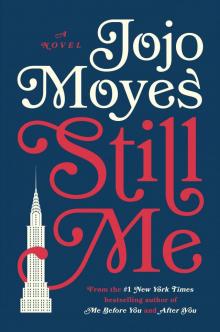 Still Me
Still Me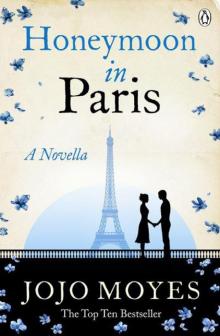 Honeymoon in Paris
Honeymoon in Paris Night Music
Night Music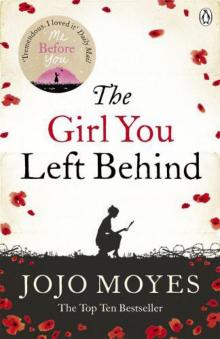 The Girl You Left Behind
The Girl You Left Behind Windfallen
Windfallen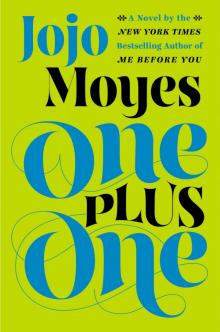 One Plus One
One Plus One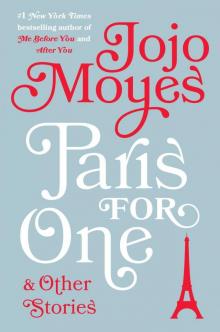 Paris for One and Other Stories
Paris for One and Other Stories The Giver of Stars
The Giver of Stars The Ship of Brides
The Ship of Brides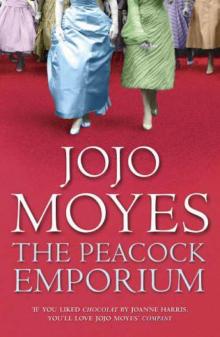 The Peacock Emporium
The Peacock Emporium Silver Bay
Silver Bay The Horse Dancer
The Horse Dancer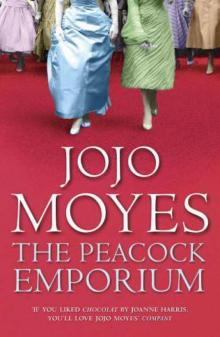 Peacock Emporium
Peacock Emporium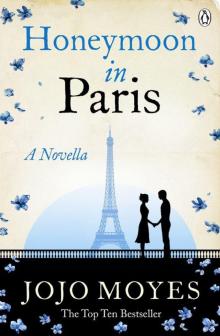 Honeymoon in Paris: A Novella
Honeymoon in Paris: A Novella Ship of Brides
Ship of Brides Paris For One (Quick Reads)
Paris For One (Quick Reads)